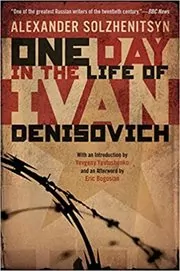One Day in the Life of Ivan Denisovich Summary
Author: Alexander Solzhenitsyn
This page offers our One Day in the Life of Ivan Denisovich summary (Alexander Solzhenitsyn's book). It opens with an overview of the book, and follows with a concise chapter-by-chapter summary.
Drafted with AI assistance and reviewed by a human editor.
As an Amazon Associate, we earn from qualifying purchases (at no extra cost to you).
This book has 2 recommenders!
Overview
In the harsh conditions of a Stalinist labor camp in 1951, prisoner Ivan Denisovich Shukhov finds himself punished with solitary confinement for oversleeping due to fever and aches. However, this sentence turns out to be a threat and his punishment consists of cleaning the officers' headquarters. After eating breakfast, Shukhov visits the clinic for his ailments, but is denied treatment as his fever isn't high enough. He successfully hides his breakfast bread during the routine body search, avoiding punitive measures unlike fellow prisoner Buynovsky, who gets a ten-day solitary stint for wearing a flannel vest. Shukhov dismisses a recent suggestion from his wife about a potential post-prison job, and heads off for work with his unit, Gang 104.
Shukhov and his Gang are sent to work at the Power Station, a construction site in the open fields. Despite the harsh conditions, Shukhov works diligently under the watchful eye of his foreman Tyurin, a firm but fair leader. During their lunch break, Shukhov manages to sneak an additional serving of food and also stashes away a piece of scrap metal with the intention to craft a knife later. After lunch, the men return to work, with Shukhov continuing to labor even after his fellow prisoners have stopped in order to safeguard his valuable trowel. When the missing Moldavian worker is found, delaying their meal, Shukhov catches up with his unit, relieved to avoid punishment for tardiness.
In the evening, Shukhov narrowly escapes punishment for carrying a piece of steel during a body search. Upon hearing about a possible food parcel being received by Tsezar, a co-prisoner, Shukhov offers to wait in line for him in exchange for a share of the meal. He enjoys a rare moment of bliss when he is rewarded with extra bread for his work performance that day. As the day ends, after a final body count and helping Tsezar protect his parcel from other prisoners, Shukhov retires to bed, feeling surprisingly content. Despite the harsh circumstances, Shukhov thanks God for getting him through another day, even sharing a biscuit with Alyoshka, a devout Baptist and fellow prisoner. The narrator concludes by reflecting that this day has been one of the 3,653 days of Shukhov's sentence.
Edited by
Software engineer whose passion for tracking book recommendations from podcasts inspired the creation of MRB.
Lead investor at 3one4 Capital whose startup expertise and love for books helped shaped MRB and its growth.







Comments
Did we miss something? Have feedback?
Help us improve this page by sharing your thoughts